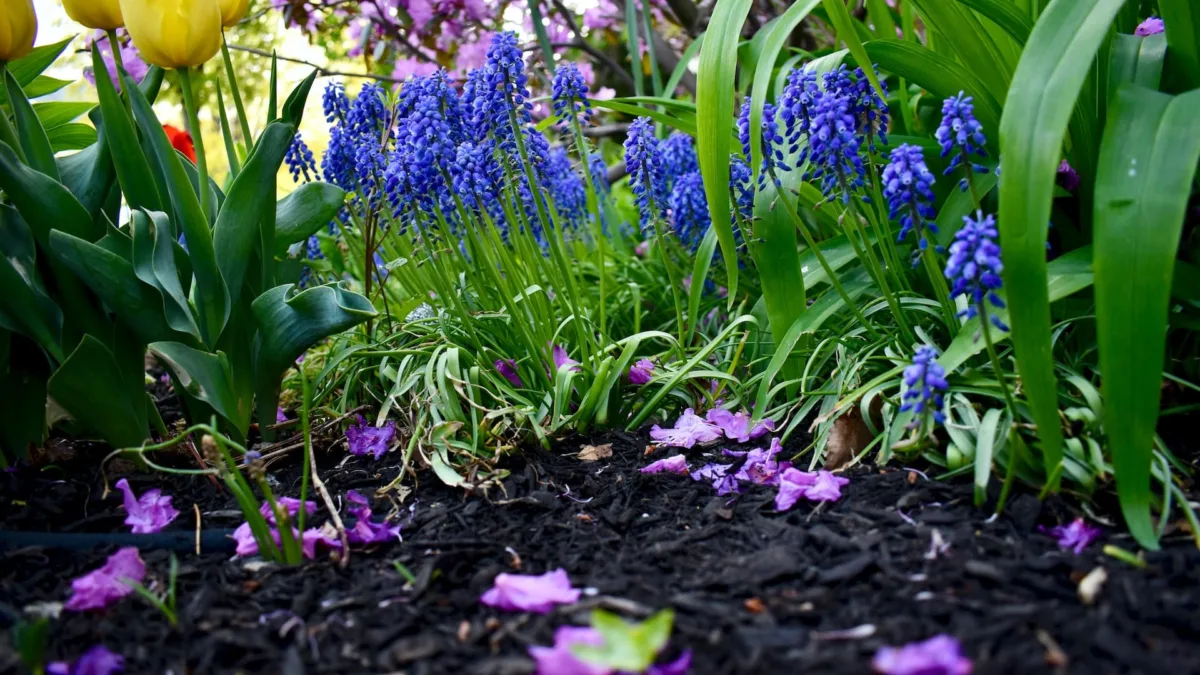Mulching your garden is an easy and inexpensive way to protect your plants and soil, add nutrients and keep your water usage in check. It’s also a great way to start fresh each year, because mulch adds nutrients to the soil as it decomposes over time (and decomposition is one of the reasons why we need plants).
Look in the nature, soil is never naked
Take a walk in the wood nearby you. Have a look at the ground underneath your feet. It is soft. Covered with leaves, small plants, mushrooms. It is like the soil of the wood is covered by an organic skin. Once you return, have a look at other natural areas around you. Maybe close to your river or lake. Everywhere you look, nature creates a kind of skin above its soil. And once you develop the sense for it, our fields act like big wounds that we inflict on the earth.
Everywhere you see soil, there is a layer of mulch covering it. It helps keep moisture in and keeps heat out, creating an environment that’s comfortable for plants to grow in. If you have ever walked through an area covered in leaves or pine needles, then you know exactly what I mean when I say this—the forest floor looks like a carpet!
Mulch also acts as an insulator against heat loss during cold months; if your garden has bare soil exposed to harsh winds and temperatures below 40 degrees Fahrenheit (5°C), then consider adding some brown leaves or pine needles to help protect your plants from frost damage!
Conserve water
Mulch helps conserve water and prevents water evaporation. This is especially important during the summer months. The more water you can save, the better! Mulch also prevents runoff from heavy rains, which is another great way to reduce water use. Mulch helps prevent soil erosion. Soil erosion is a huge problem, especially in places where farming is common. You work hard on the quality of your soil and don’t want to see it just disappear
Mulch keeps the soil temperature consistent
Mulch can help keep your soil temperature consistent. A thick layer of mulch will help regulate soil temperature. This way it will prevent your garden from getting too hot or too cold.
Mulching also helps prevent winter damage by protecting the ground from freezing temperatures. Those temperatures can damage plants’ roots during cold spells. A layer of straw on top of your soil is an easy way to add extra protection against frost heave.
Mulch can help control weed growth.
Mulch can help control weed growth. While mulching a garden is not a guarantee against weeds, it can help prevent them from growing in the first place. Mulch will smother weeds and prevent them from sprouting, as well as preventing light from reaching their seeds for several months at least.
Mulch also has an acidity level that prevents weed seeds from germinating, so it’s possible to keep your garden looking beautiful without having to do any work at all!
Add mulch to new beds before you plant.
- Mulch can help to keep the soil temperature consistent
- Mulch can help to keep the soil moist
- Mulch can help to control weed growth
- Mulch can help to protect the roots of your plants from drying out, which is especially important for new transplants or young seedlings. The more moisture there is in the soil, the better it will be for any type of plant you grow—even if it’s not a flower or vegetable!
- You may also want to consider using mulches on top of your beds so that any weeds that do manage to get through will have less competition for nutrients and sunlight.
Use mulch to maintain established beds.
Mulch can be used to maintain established beds, helping to conserve water and keep the soil healthy.
The best way to use mulch is in layers that are about 4 inches thick. The layers should be placed so they overlap each other slightly, forming a protective barrier between the soil and elements. The general rule is one inch of material per foot of depth; however, this varies depending on what type of mulch you’re using and where it’s located within your garden bed (e.g., if there’s an area that gets exposed to direct sunlight).
Mulching your garden can help protect and nourish your plants
The benefits of mulching your garden are many. Not only can it help maintain consistent soil temperatures, but it also protects the soil from erosion and control weeds and retains water. It also acts as a barrier between the roots of your plant and harmful elements such as windblown debris. While your mulch decomposes it adds healthy nutrition to your soil and helps establishing healthy microorganisms in it.

